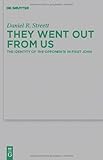 At the 2011 Fresno Koine Greek Fluency Workshop, which I was unable to attend, a song that dealt with body parts was introduced to the participants. Eric Weiss posted about this on the B-Greek forum and helpfully included the lyrics and the tune. I had my teaching assistant record an audio version of it, which you can download here.
At the 2011 Fresno Koine Greek Fluency Workshop, which I was unable to attend, a song that dealt with body parts was introduced to the participants. Eric Weiss posted about this on the B-Greek forum and helpfully included the lyrics and the tune. I had my teaching assistant record an audio version of it, which you can download here.
Here are the lyrics:
ΤΟ ΑΣΜΑ ΤΟΥ ΣΩΜΑΤΟΣ
Ὁ Χορός:
Πόδες, χεῖρες, κεφαλή
̓Ὤμοι, ὦτα, στόμα,
Ὀφθαλμοὶ, κοιλία, ῥίς
Πάντα ἔχει σῶμα
(Πρώτη Στροφή)
Ἅπτομαι τοῦ στόματος
Νῦν ἐπαίρω χεῖρας
Ἅπτομαι καὶ τῆς ῥινός
Δείκνυμι τοὺς πόδας
(Ὁ Χορός)
(Δευτέρα Στροφή)
Τοῖς ὦσιν ἀκούω σου
Τύπτω ταῖς χερσί μου
Βλέπω σε τοῖς ὀφθαλμοῖς
Τρέχω τοῖς ποσίν μου
(Ὁ Χορός)
I taught the song to my students last week and it was a hit. We had just covered body parts, so all the vocabulary was familiar. The song is best learnt along with motions. Have students point to each body part as they sing it, and act out the actions like touching, pointing, hitting, etc. This is a great way to bypass the left brain (analytical) and to activate the right brain, where languages are acquired.
Update: Brian Schultz comments below: “FYI – Sharon Alley’s SOMA song, with video showing the actions that accompany it, can now be viewed on the BLC blog. Check it out at http://www.biblicallanguagecenter.com/soma-song/“





Any idea why ῥίς was chosen for “nose” rather than μυκτήρ?
Probably for purposes of meter/rhythm. As far as I can tell, they are basically synonyms. Can you think of a reason μυκτήρ should be preferred?
When I made up my “parts of the body” list in Greek, I searched for “nose” in an English translation, then looked up what word the Greek used. IIRC, μυκτήρ appeared more times in the LXX than ῥίς (but I didn’t have advanced computer software like BW 9, so I could have miscounted some forms). At any rate, μυκτήρ was what I wrote down to study.
My search shows 10 hits for each in the Greek Bible (Apocrypha included), none in the NT. I think students should learn both (mine do). Also, μυκτηρ is helpful to know because we have a good verb that incorporates it (μυκτηριζω). Students usually have no problem remembering each when we link the words straight to the body part, and I usually add on some cognates to help out–e.g., Rhinoceros (nose-horned or horn-nosed). And it’s great to learn body part functions along with the body parts (οσφραινομαι τινος).
In the first stanza you pronounced ‘Νῦν’ with Erasmian pronunciation, but in two lines down you used modern Greek pronunciation for ‘Δείκνυμι.’ Was this your intention? I look forward to meeting you at SBL next week.
Hi, Michael. It’s not actually me singing (you really don’t want to hear that!), but my student assistant. I teach my students a modern pronunciation, though I still try to pronounce my upsilons as [y], since without that, several things in Koine get way too confusing. Of course, in words where υ appears in an unaccented syllable (e.g., δείκνυμι), it is virtually indistinguishable from [i].
I’m looking forward to your presentation on pronunciation. I attended your paper on using inscriptions/manuscripts in teaching Greek (can’t remember if that was last year or the year before) and found it very engaging.
Pingback: Soma Song | Biblical Language Center
FYI – Sharon Alley’s SOMA song, with video showing the actions that accompany it, can now be viewed on the BLC blog. Check it out at http://www.biblicallanguagecenter.com/soma-song/.
On ῥίς, it appears to be the more generic word when checked out in Greek sources discussing body parts. Check out Galen (RIS 72xx nom., MYKTHR 8xx nom.) and Oribasios.
Note Ps 115.6 (LXX 113.14) and 135.17 (LXX 134.17), too, which are in general body part/function contexts. Epiktetus uses RIS in bodypart ‘nose’ contexts, too, though I don’t have references at hand. Isaish 37.29 uses singular RIS for the physical nose appendage while the parallel in Kings has plural MYKTHR, probably better as ‘nostrils’. However, MYKTHR is used in singular in LXX as a synonym for RIS (Song 7.5, Ezek 16.12, 23.25). So for learning, RIS is the generic Greek word of choice and MYKTHR appears to be the more specialized.
Thanks, Randall! It does seem to me that μυκτηρ (esp in pl.) is used more often to refer to the nostrils specifically rather than the nose as whole.
Pingback: Biblical Studies Carnival 69 (November 2011) | Remnant of Giants